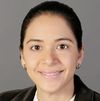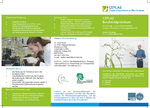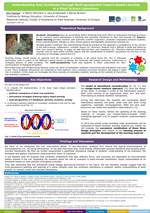CEPLAS School Project Research and Education "Transfer Of Knowledge From Research To School"
Sustainable transfer of knowledge from CEPLAS research topics into practice-oriented teaching
The Research and Education Project was conceived jointly by CEPLAS, the “Zentrum für LehrerInnenbildung“ (Center for Teacher Training) and the “Institut für Biologiedidaktik“ (Institute for Didactics in Biology) at the University of Cologne in 2015. The aim is to interest advanced high school students in plant research by acquiring practical research experience in small, guided experiments.
Due to time reasons, teachers are less often able to educate their pupils in basic scientific knowledge, for example in biology. The CEPLAS project "Research & Education" would like to help bridging this gap and, therefore, convey the fascination of scientific work already at school. For this purpose, special teaching modules are in development, which can be carried out by biology teachers without major effort or special tools and which should motivate teachers to address new aspects of plant biology. In the first phase of the "Berufsfeldpraktikum", students who will become a teacher in a few years are involved in the design and application of the teaching modules and thereby will gain first teaching experience.
The thematic focus has so far been on the interaction of plants with the environment, but in the long term other teaching modules from the CEPLAS context, e.g. on food security, climate change or genetic engineering of crop plants will be implemented. Below you will find detailed information on the concept, the implementation and the project partners involved.
In addition, one aim of CEPLAS "Research & Education" is to serve as a best practice model for STEM education (German MINT), combining the concepts of discovery-based learning and classical block teaching in order to adapt teaching at university and school to current requirements.
Since September 2016, the CEPLAS Research and Education project is also supported by the Robert Bosch Foundation and the RheinEnergie Stiftung.
CEPLAS Research & Education "Transfer of knowledge from research to school"
Concept and added value for schools
Most existing forms of knowledge transfer from research to school are based on short interventions, raising doubts about long-lasting effects. As an alternative, the CEPLAS Excellence Cluster will try to use a different, longer-term form of knowledge transfer, which includes excellence research and education as well as external cooperation partners. Future teachers as well as teachers in service will be trained on newest developments in plant sciences and research-oriented teaching modules will be provided thus serving as multiplier for the transfer of scientific knowledge.
One aim of secondary schools is to strengthen individual support, however, this is difficult to fulfill due to time restrictions. To address this need, the project provides an excellent offer for the promotion of highly motivated and interested biology pupils. At the same time, the cooperation with CEPLAS contributes to the preparation for study and profession, as requested in the guidelines of the Ministry of Education in North Rhine-Westphalia.
In the pilot phase the focus is on the following biological questions:
- How do environmental and genetic factors shape the plants’ interaction with microorganisms in the soil?
- What effects do microorganisms that colonize the plant (the plant microbiome) exert on plant growth and development?
Both topics cover subjects, which are relevant for the “Abitur” (German High School certification).
Our existing partnerships are characterized by a clear commitment of the school management to support this project as well as by active biology departments and high motivation among teachers and pupils.
If your school is also interested in the cooperation with the Excellence Cluster CEPLAS, please do not hesitate to contact us!
Development of research-oriented teaching modules
In the pilot project, motivated upper-level pupils and biologists were brought together with Bachelor of Arts and Master of Education students (Teacher Training Program) and CEPLAS scientists in order to jointly develop research and teaching modules for Gymnasia (high schools).
In the first phase, students, who will become biology teachers, stay 3-weeks in a CEPLAS laboratory, where CEPLAS scientists teach them state-of-the-art concepts and methods in plant sciences. Subsequently, the students develop teaching modules in collaboration with the “Institut für Biologiedidaktik” and the “Zentrum für LehrerInnenbildung”. Guidance-based interviews with CEPLAS scientists and teachers are the basis for the development of research-oriented teaching units. Whether their modules are suitable for teaching, students can then "test" directly with high school pupils that visit together with their teachers the University of Cologne labs for a few days.
The entire project is closely monitored scientifically and, within the scope of a doctoral thesis, the evaluation of the transfer of knowledge takes place qualitatively through interviews with Bachelor of Arts and Master of Education students (Teacher Training Program), teachers and pupils. The next step is that the already practically tested teaching modules will be further developed until they can be used directly by the teachers at school.
An important result of this cooperation project will be the creation of practice-oriented teaching modules, which will convey current CEPLAS research results from basic and applied plant research in a form, which can be used directly in the classroom.
Project partners
- Institut für Biologiedidaktik
- Zentrum für LehrerInnenbildung
- Graduiertenschule für LehrerInnenbildung
- Modularer Modellgarten Köln
- TH Köln – University of Applied Sciences
- Robert-Bosch-Foundation (Program „Our Common Future“)
- Ville-Gymnasium Erftstadt
- Ursulinenschule Hersel
- Konrad-Adenauer-Gymnasium Langenfeld
- Otto-Hahn-Gymnasium Bensberg
- Städtisches Gymnasium Frechen



